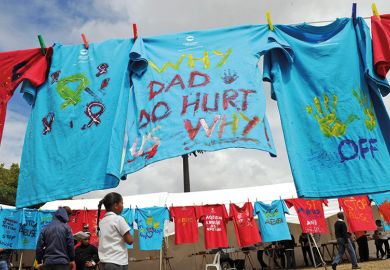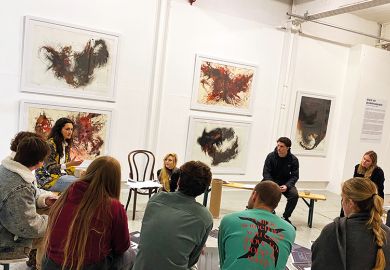As violence rages in the Middle East and Ukraine, there is no shortage of sites for intrepid researchers of violence to conduct their fieldwork.
I well recall my first research trip into the jungles of Chiapas, Mexico, 20 years ago, as the Zapatista Army of National Liberation marked the 10th anniversary of its uprising in the country’s southernmost state.
My encounters with the Zapatistas were informative in many ways, not least regarding the methods and ethics of researching violence. Quickly learning how many of my preconceptions about the world simply didn’t apply to their local context, I realised that the study of violence needs to begin with the complex reality of human life. Theoretical tools are merely instruments that may or may not yield meaningful results. I also learned to recognise the power of testimony and the fact that communities in conflict zones are not just “objects” to be studied.
But, recently, I’ve been asking myself why I needed to travel to the other side of the world to study violence when I grew up in communities blighted by similar issues of underdevelopment, political neglect, criminality and daily brutalities. The former mining valleys of South Wales top most league tables for social and political concern in the UK and beyond. Yet I barely wrote about them, let alone considered them as the focus for my research.
This changed four years ago as I began my latest book, How Black was my Valley: Poverty & Abandonment in a Post-Industrial Heartland (Repeater Books). The more I returned to the valleys, the more the above question impressed upon me. The first answer that came to hand was the safety of distance – not so much geographical as emotional. Violence is easier to study at a distance because it allows us to bypass difficult questions about ourselves.
But the challenges of returning our attention to the home front go beyond confrontation with any personal forms of trauma. One difficulty is the collapse of the personal into the political, which risks the collapse of emotion into truth. I lived and breathed some of the valleys’ most dire concerns, and the associated politics feels deeply personal as the winners and losers in the struggle for power are not arbitrarily selected. Yet reducing the complexity of a lived situation to a singular narrative or truth, perhaps presented in an uncompromising and overly sensitive way, is poor scholarship.
Testimony is important, including one’s own experiences. But we should not conduct research when any questioning of its premise feels like an attack on our own selves. This has been one of the most unfortunate developments in identity politics, resulting in the hierarchies of emotional truth widely circulating even in universities today about who is the greatest victim of history. Politics shouldn’t lose sight of the need for big ideas to counter debilitating personal experiences.
We must be attentive to further challenges to the integrity of the researcher, too. In Mexico and elsewhere, I was acutely aware of my status as a privileged, educated “outsider” trying to understand local knowledges. I was grateful for the professional courtesy that status afforded me, but I was occasionally wary of it, especially when host communities exhibited deferential behaviours, which we know have underwritten some of history’s gravest abuses of power.
The challenges of being an “insider” are no less fraught, however – especially when returning to impoverished communities you left in search of a better life. Those with intimate knowledge of your early life are typically sceptical of your status as an expert; in their eyes, you are still the person they knew many years ago. Others are suspicious of your right to now speak with authority on local matters. This simply requires humble acceptance; being challenged shouldn’t be experienced as a problem by researchers (or, indeed, by communities).
A related difficulty is to position oneself as speaking with an authentic voice. Enormous strides have recently been made in anthropology and cultural studies to question the way those in privileged positions (notably from elite academic institutions) have replaced marginalised voices, to the detriment of local cultures and knowledge systems. The idea that subalterns should speak for themselves has become a bedrock for identity politics.
Yet authenticity is often selectively defined. While questions of race, gender or sexual politics are deemed to demand speaking with an “authentic” voice, issues of poverty and class seldom are. And authentically claimed voices can seek to impose a universal truth, which will always be academically problematic.
The biggest challenge of researching violence in your own community, however, is maintaining professional distance in the company of people you know and care for. Researchers of violence should pursue the highest ethical standards, ever appreciative of our work’s consequences, especially for host communities. Yet that doesn’t mean the research should be comfortable, let alone comforting. Writing on violence can be perilous, politically fraught and unsettling, especially when it is likely to upset people you deeply respect, but we need to believe in the freedom to conduct such research nevertheless.
Ultimately, the only way to properly research violence within communities known intimately is to acknowledge that complexity is more important than identity. While the singular voice shouldn’t be denied, we must still try to find ways to walk the thin line between our own subjective investments and the desire to understand the past and present. That is the best way to steer the future in a better direction.
Brad Evans is director of the Centre for the Study of Violence and professor of political violence and aesthetics at the University of Bath.
Register to continue
Why register?
- Registration is free and only takes a moment
- Once registered, you can read 3 articles a month
- Sign up for our newsletter
Subscribe
Or subscribe for unlimited access to:
- Unlimited access to news, views, insights & reviews
- Digital editions
- Digital access to THE’s university and college rankings analysis
Already registered or a current subscriber?








